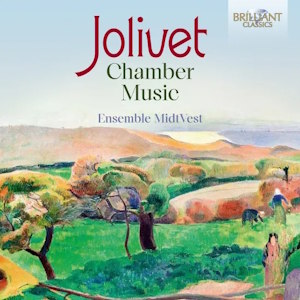
André Jolivet (1905-1974)
Chamber Music
Ensemble MidtVest
rec. 2013-15, Heart-Herning Museum of Contemporary Music, Herning, Denmark
Brilliant Classics 97400 [70]
The French composer André Jolivet studied with Paul le Flem and later with Edgard Varèse, who stimulated his interest in modernism and the magical and incantatory powers of music. He was a member of a short-lived group called La Jeune France along with Jean-Yves Daniel-Lesur, Yves Baudrier – and Olivier Messiaen, who wrote enthusiastically about some of Jolivet’s early works. He wrote prolifically, with three symphonies, twelve concertos, much chamber and piano music and a good deal of incidental music for the stage. His idiom is modernistic, but not aggressively so. He has been reasonably well recorded; some listeners will know the four disc set of his works from French EMI (review) and there have been many other individual issues, though we could do with new recordings of the symphonies. In recent years Brilliant Classics have taken a welcome interest in Jolivet, and this disc is the latest to come from them.
The Sérénade started life as a work for oboe and piano, which the composer then worked up into a wind quintet, his only work in this medium. It is in four movements, with the oboe often having the lead. The opening Cantilène begins with the oboe but then the flute has a melody drawing on the octatonic scale also used by Russian composers and Messiaen. The following Caprice is a scherzo, pungent and quirky but with a gentle Trio. The Intermède is led by the clarinet in gradually expanding phrases. The finale is titled Marche burlesque and has something of Prokofiev about it. This is a really good work, more substantial than many wind quintets, able to rank with the wind quintets of Nielsen, Schoenberg and Birtwistle.
The Sonatine for flute and clarinet is a surprisingly rich and complex work, given that no more than two notes can be sounded at any one time. In the first of its three movements I noted the subtly interweaving lines of the two instruments. The second movement is marked Quasi cadenza, and indeed each instrument has a chance to shine. The final Intermezzo again brings us an octatonic melody, after which we have a kind of folk dance.
Controversia for oboe and harp was written for Heinz and Ursula Holliger, who play these instruments and commissioned works for the two of them. Heinz Holliger had been developing new techniques on the oboe, including multiphonics and Ursula introduced tapping the soundboard and quartertones on her harp. This single movement work exploits these techniques. However, despite them – or perhaps because of them – I found it the least interesting work here.
The Petite Suite for flute, viola and harp is for the same combination as Debussy’s famous late sonata (and the title is from him too). There are five movements. The opening Prélude has an acrid melancholy. The following Modéré begins with flute calls and moves to a gentle swaying dance. There follows a scherzo, a rather Debussyan slow movement and a light and cheerful finale. This work obviously asks to be programmed alongside the Debussy sonata, which it would complement well.
The Sonatine for oboe and bassoon is a partner to that for flute and clarinet. The opening Ouverture is declamatory, the Récitatif both plaintive and harsh and the final Ostinato pungent and perky. This is a more challenging work than the other Sonatine but still a good one.
Finally, the Pastorales de Noël for flute, bassoon and harp are in four movements. This is a tuneful traditional work, which could almost be by Fauré. The opening L’Étoile is meditative. Les Mages is suitably exotic, using an Indian scale, La Vierge et L’Enfant is a lullaby and the final Entrée et danse des bergers derives from folksong. The titles of the four movements are so close to those of four of Messiaen’s Vingt Rgards sur L’Emfant Jésus, written the following year, that I wonder whether Jolivet’s work helped give Messiaen the idea for his much larger one.
The performances here are by a Danish group, Ensemble MidtVest, a mixed ensemble which has made many recordings. Their performances her are crisp and idiomatic and make an excellent case for the works. The recording is good and the booklet, in English only, informative. I hope for more Jolivet from Brilliant Classics.
Stephen Barber
Buying this recording via a link below generates revenue for MWI, which helps the site remain free



Contents
Sérénade for wind quintet (1945)
Sonatine for flute and clarinet (1961)
Controversia for oboe and harp (1968)
Petite Suite for flute, viola and harp (1941)
Sonatine for oboe and bassoon (1961)
Pastorales de Noël for flute, bassoon and harp (1943)

















